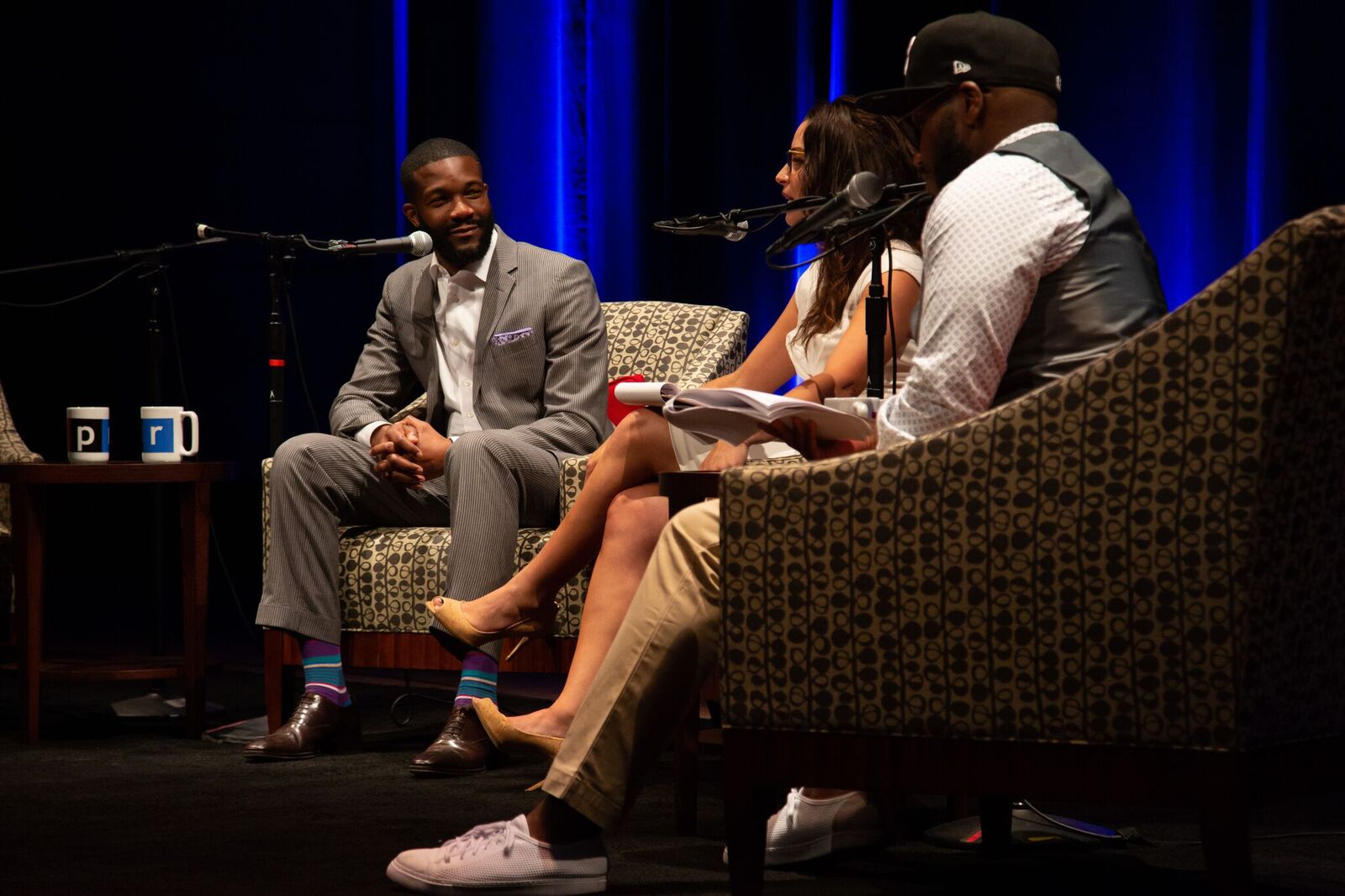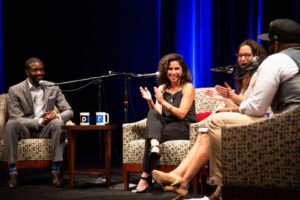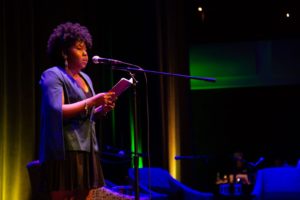
By Erica Wright
The Birmingham Times
The role of race, ethnicity and culture in Birmingham was the topic of a fascinating discussion Tuesday evening where WBHM 90.3 FM and National Public Radio (NPR) presented Code Switch, a popular talk show on NPR, live from UAB’s Alys Stephens Center.
Code Switch is a team of NPR journalists whose work appears in a weekly podcast, on-air, online and across NPR’s shows and digital outlets. The live recording featured hosts Shereen Marisol Meraji and Gene Demby with Birmingham Mayor Randall Woodfin; WBHM News Director Gigi Douban and special guest Birmingham native and poet, Ashley M. Jones.
Woodfin spoke on a number of topics including how his legal background has been important in the way he treats people.
“For me [as a prosecutor] it was all about how to help people, how to bring the issues to a resolve and how to help victims but believe it or not how to help defendants as well,” Woodfin during an Ask The Mayor segment. “I can tell you how I know it worked because the people would see me in the street and say ‘Hey! Thank you so much! You remember me? You represented me’ and in my mind, I’m like ‘Actually, no, I didn’t, I was your prosecutor’ but it’s how we treat people . . . in treating people right, I think we can find a way to close some issues that are systemwide but at the same time help that individual.”
Woodfin talked about the tension between revitalization efforts and gentrification and how that has become a divisive issue for some.
“I’m looking at what is happening in [Washington] D.C. and D.C. used to be called ‘Chocolate City’ and in 2018 you can’t call D.C. [that] anymore” because of gentrification, he said. “I think for Birmingham . . . what can we do, a city made up of 99 neighborhoods where 88 of them are all black and 11 of them are majority white, what can we do to ask do we want revitalized neighborhoods?” he said. “How do we protect the existing residents from an affordability standpoint when we have a high amount of renters in our city so it’s not necessarily isolated to one side of town?”
During the Ask Code Switch segment Douban shared some of her personal experiences in response to issues people face on a daily basis.

“Both of my parents are from Egypt and so my high school economics teacher said to me, ‘so Gigi, are you going to grow up to become a terrorist one day’, but at the time I was just so taken aback by it that in the moment it just didn’t really register . . . then you have that moment later where you’re thinking, ‘did that really just happen’,” she said.
“So, since moving here, I’ve gotten a lot of ‘what are you, where are you from’ and so for me when people ask where I’m from, I never really know what they mean like geographically or what is my ethnicity and so I always ask what they mean and they have to sort of differentiate,” Douban said. “So, I feel like sometimes it is a little jab, but other times, sometimes people just might not know and so I ask that clarifying question to find out if it’s an honest question or a microaggression.”
Meraji added, “I’m Puerto Rican and Iranian, but it’s very confusing for people and I feel like my whole life has been navigating these kind of strange questions on ‘what are you?’ and ‘where are you from’? and it was in college when I decided I am going to learn as much as I can and so I took a lot of ethnic studies courses and I really made answering this question my life’s work.”
The issue of interracial dating in Alabama also came up.
“It’s not something that you did, even when I was in high school, it wasn’t explicit but it was something that you just felt,” said Woodfin. “My parents divorced when I was eight years old and are both now happily married. My mother is in an interracial relationship, she’s married to a white man and they’ve been married over a decade now and it’s just interesting to listen to her when she was growing up where she had to walk past Woodlawn High School to go to Hayes [High School] . . . not just dating but how race played a role in Birmingham, I think it’s interesting watching my own mother be in an interracial relationship.”
‘The Heart of Dixie’
During the show, Jones read two of her poems, Riddled in the Heart of Dixie and Viewing a KKK Uniform at the

Civil Rights Institute, and talked with Code Switch hosts about her poems and growing up in Birmingham.
“Growing up in the South, a lot of us who grow up here have a love-hate relationship and I hated it when I was a kid and I thought ‘I’m getting out of here as soon as I can, it’s so backwards’ . . . once I left I thought, ‘Why did I ever leave? This is my home, this place is so cool,” she said.
Jones, a creative writing teacher at the Alabama School of Fine Arts (ASFA), talked about the misconceptions people from other places have about race in the South.
“I think the biggest thing that people get wrong . . . is that somehow we’re not a part of the United States of America,” she said. “People think that these problems don’t exist everywhere else and we’ve seen time and again that they do.”
Code Switch is available to listen on NPR One, Apple Podcasts and Google Podcasts.




